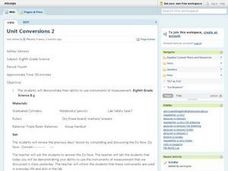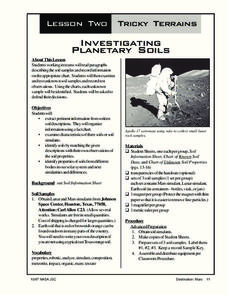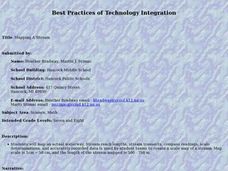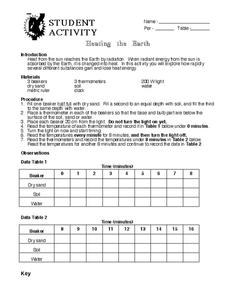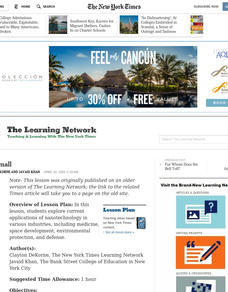Curated OER
Units of Length
In this length worksheet, students convert measurements of length from one metric unit to another. They measure line segments, indicate their measurements and read a metric ruler.
K12 Reader
Measuring Temperature
Fahrenheit? Celsius? What's the difference, and where did these two temperature scales originate? Your pupils will learn all about these topics by reading the passage included here. After reading, individuals respond to five questions...
Curated OER
Get a Leg Up
Traveling through space is an amazing experience, but it definitely takes a toll on the body. After reading an article and watching a brief video, learners perform an experiment that simulates the effects of zero gravity on the...
Curated OER
Unit Conversions 2
Eighth graders demonstrate the use of instruments of measurement. As a class, they take notes and observe the proper procedure for using a graduated cylinder, a ruler, and a balance/triple beam balance. In groups, 8th graders visit...
Curated OER
MEANINGFUL METRICS with DRAMATIC DEMONSTRATIONS
Tenth graders study the metric system. In this metric lesson students complete a lab activity and several metric worksheets.
Curated OER
Solar Kit Lesson #15 - Solar-Powered Electrolysis of Water and the Hydrogen Economy
An outstanding lesson awaits your physics fledglings! After reading about how hydrogen can act as an energy carrier, they examine the electrolysis of water using solar power. They test the gases produced for flammability and will...
Curated OER
How Toxic Is It?
Students participate in an activity in which they investigate the scientific method and seed germination as well as practice graphing and metric measuring skills. Students examine toxicity by exposing Wisconsin Fast Plants seeds to toxic...
Virginia Department of Education
Solar System Model
How many planets can you name? Did you get all 13 in our solar system, including the dwarf planets, or were you surprised when you read there are 13 planets? The lesson helps scholars understand the scale of the universe including the...
Curated OER
Heating and Cooling a Really Large Lizard
Remind your middle school scientists how fox ear size varies depending on the climate they live in; large ears allow heat loss while small ears keep heat in. Discuss how a cold-blooded animal might try to regulate body temperature. Then...
Curated OER
Significant Figures and Measurement
In this science activity, students draw several markings on a ruler or graduated cylinder or thermometer to get each of the correct measurements. Then they state what place the marking indicates and the number of significant figures in...
Curated OER
Parachutes: What Affects a Parachute
Young scholars create a simple paper parachute. In this parachute design lesson, students examine the effects of the wind and make napkin parachutes.
Curated OER
Investigating Planetary Soils
Students study soil characteristics and identify properties of soils from different parts of the solar system. In this soil lesson students divide into groups, read soil descriptions, test and record soil samples.
Curated OER
Teaching About Plate Tectonics and Faulting Using Foam Models
Young scientists learn about plate tectonics and the three different types of faults (normal, reverse, and strike-slip) using foam models. The activity also covers common types of locations where these faults are found.
Curated OER
SURVIVING A COSMIC INVASION
Students read periodicals relating to radioacitivity and interpret a Geiger Counter. They work in small groups, share information and help each other explain the Geiger Counter. They discover the relationship distance to...
Curated OER
Earth Science: In Depth Look at Earthquakes
Learners engage in an interactive Internet lesson covering the reasons and results of earthquakes. After reading eyewitness accounts and viewing animations, they use seismograms to measure and locate the epicenters. In an ongoing study,...
Curated OER
Testing for Catalase Activity
For this catalase worksheet, students read about how enzymes work in cells. Then students conduct an experiment to test for catalase activity in potatoes. This worksheet has 1 graph and 6 short answer questions.
Curated OER
Who? Who? Whoooooooo?
Students read Poppy by Avi and then dissect an owl pellet. They complete a KWL chart and play vocabulary games to prepare for the dissection. They examine what the pellet can tell us about the owl's life.
Curated OER
Mapping A Stream
Young scholars participate in mapping an actual waterway. They include reach lengths, transects, compass reading, and scale determinations. They include windfalls, plant cover, types of streambed composition, and landmarks such as...
Curated OER
"Use an Anemometer," said the Meteorologist
Students participate in an hands-on construction of an instrument to measure wind speed.
Curated OER
Make a Dinosaur
Students estimate the size of dinosaurs and create a dinosaur model. They create bar graphs of the sizes of dinosaurs one in meters and the other in "student" units. They draw a pictures and add words or sentences about their dinosaur.
Curated OER
Mapping The Ocean Floor
Young scholars explore and analyze the bottom structure of underwater habitats. They describe and explain what can't see through the collection and correlation of accurate data. Learners assess that technology is utilized as a tool for...
Curated OER
How Big is a Lunar Crater?
In this lunar crater worksheet, students use an image taken by the Lunar Orbiter spacecraft to find the scale of the image and determine the diameter of the lunar crater Tycho. They also find the size of the smallest and largest features...
Curated OER
Heating The Atmosphere
In this science worksheet, high schoolers look for the answers to finding the correct temperatures that match the location in the atmosphere.
Curated OER
Think Small
Students explore current applications of nanotechnology in various industries, including medicine, space development, environmental protection, and defense.



